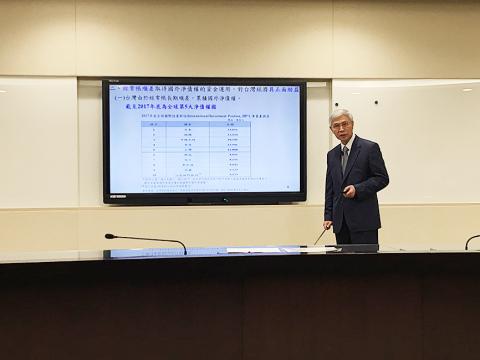The nation’s persistent financial account deficit reflects a continuous search by Taiwanese life insurance companies for recurring income to match their debt obligations, a move that is common in nations with current account surpluses, central bank Governor Yang Chin-long (楊金龍) told reporters in Taipei yesterday.
Yang called the unscheduled news conference after Taiwan in the second quarter recorded a net outflow in its financial account for the 32nd consecutive quarter, with a total outflow of US$380.42 billion.
“The phenomenon is neither unique nor problematic, as seen in 20 of 37 advanced economies [that had current account surpluses] last year,” Yang said.

Photo: Wu Chia-jung, Taipei Times
Domestic life insurers have to seek fixed-income assets overseas due to a lack of investment tools in Taiwan, he said, adding that the financial health of the central and local governments have rendered bond issuances unnecessary.
The absence of capital outflows would cause foreign exchange reserves to swell and place the New Taiwan dollar under sharp appreciation pressure, Yang said.
This happened to Switzerland in the past and its central bank had to cut interest rates and fix foreign exchange values against the euro to help stabilize its economy, he said.
Overseas investments help ease excess savings in Taiwan and increase net external debt claims, which can serve as a buffer when local financial markets take a hit from rapid global capital movements, Yang said, adding that they allow local investors to gain better yields.
Capital outflows also happen when local firms acquire critical technology or strategic resources abroad through mergers and acquisitions to stay competitive in the global marketplace, he said.
Taiwan can opt to curb capital outflows by developing an economy with greater reliance on domestic demand, Yang said.
Since the 2008 global financial crisis, Singapore, South Korea and Hong Kong have cut dependence on exports through a series of economic and industrial reforms, he said.
Similarly, the government could also increase public construction spending and direct private funds to infrastructure projects, he added.
Fiscal stimulus measures can help encourage private investment, bolster capital formation and create new jobs, Yang said.
“That would make Taiwan’s small but open economy less susceptible to external blows,” he said.
Yang stood by his monetary policy, saying that it is not the cause of financial account deficits.
Firms assign equal importance to interest spread and foreign exchange rates when they plan moves, he added.

CHAOS: Iranians took to the streets playing celebratory music after reports of Khamenei’s death on Saturday, while mourners also gathered in Tehran yesterday Iranian Supreme Leader Ayatollah Ali Khamenei was killed in a major attack on Iran launched by Israel and the US, throwing the future of the Islamic republic into doubt and raising the risk of regional instability. Iranian state television and the state-run IRNA news agency announced the 86-year-old’s death early yesterday. US President Donald Trump said it gave Iranians their “greatest chance” to “take back” their country. The announcements came after a joint US and Israeli aerial bombardment that targeted Iranian military and governmental sites. Trump said the “heavy and pinpoint bombing” would continue through the week or as long

TRUST: The KMT said it respected the US’ timing and considerations, and hoped it would continue to honor its commitments to helping Taiwan bolster its defenses and deterrence US President Donald Trump is delaying a multibillion-dollar arms sale to Taiwan to ensure his visit to Beijing is successful, a New York Times report said. The weapons sales package has stalled in the US Department of State, the report said, citing US officials it did not identify. The White House has told agencies not to push forward ahead of Trump’s meeting with Chinese President Xi Jinping (習近平), it said. The two last month held a phone call to discuss trade and geopolitical flashpoints ahead of the summit. Xi raised the Taiwan issue and urged the US to handle arms sales to

State-run CPC Corp, Taiwan (CPC, 台灣中油) yesterday said that it had confirmed on Saturday night with its liquefied natural gas (LNG) and crude oil suppliers that shipments are proceeding as scheduled and that domestic supplies remain unaffected. The CPC yesterday announced the gasoline and diesel prices will rise by NT$0.2 and NT$0.4 per liter, respectively, starting Monday, citing Middle East tensions and blizzards in the eastern United States. CPC also iterated it has been reducing the proportion of crude oil imports from the Middle East and diversifying its supply sources in the past few years in response to geopolitical risks, expanding

Pro-democracy media tycoon Jimmy Lai’s (黎智英) fraud conviction and prison sentence were yesterday overturned by a Hong Kong court, in a surprise legal decision that comes soon after Lai was jailed for 20 years on a separate national security charge. Judges Jeremy Poon (潘兆初), Anthea Pang (彭寶琴) and Derek Pang (彭偉昌) said in the judgement that they allowed the appeal from Lai, and another defendant in the case, to proceed, as a lower court judge had “erred.” “The Court of Appeal gave them leave to appeal against their conviction, allowed their appeals, quashed the convictions and set aside the sentences,” the judges